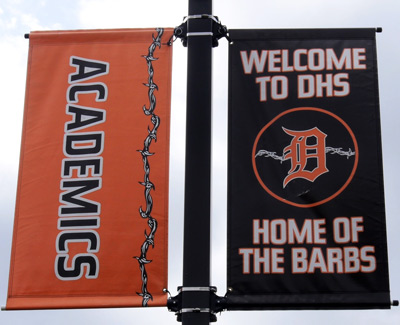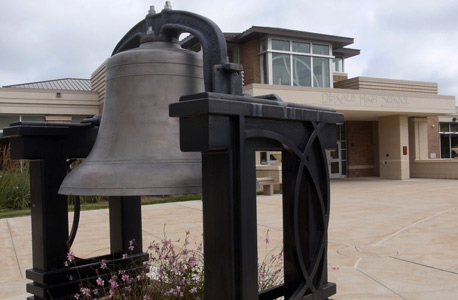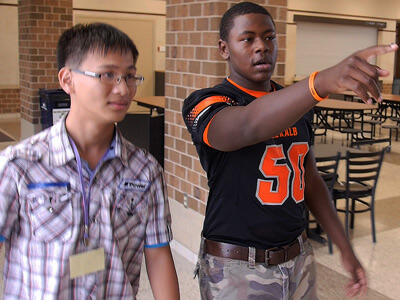 During the last hour of any Friday work day – even the 12th period at DeKalb High School – concentration does not always come easily.
During the last hour of any Friday work day – even the 12th period at DeKalb High School – concentration does not always come easily.
Five days of labor are coming to an end. The weekend beckons. Just one more lap to go, and with any luck, time is barreling downhill.
But for the 35 juniors in Judy Stafstrom’s 2 p.m. social studies class, serious thinking remains the business of the day. Stafstrom is moderating a Socratic Seminar, where students must debate an issue put before them.
Naturally, some unrelated housekeeping issues require attention. A review of upcoming homework. A warning about the ills of plagiarism. A quick tutorial on how to submit papers electronically.
Ready to begin the Socratic Seminar, Stafstrom first quizzes her class about the ancient philosopher.
What do we know about Socrates? He was killed for his ideas, one student answers. So, the teacher reasons, ideas are powerful. What else? He taught through conversation, she says, allowing the individual to follow the thought process.
Stafstrom also sets the ground rules. Be civil and engaged. Know the text. Only those students seated inside the circle will speak; those in the outer ring can support the people in front of them by whispering ideas in their ears. Finally, there are no right or wrong answers or comments.
On this Friday, the text up for discussion comes from a Fourth of July oration delivered by Frederick Douglass in 1852 to the Rochester Ladies Anti-Slavery Society. Summed up in 28 words: “The rich inheritance of justice, liberty, prosperity and independence, bequeathed by your fathers, is shared by you, not by me … this Fourth of July is yours, not mine.”
The teacher gives her class five or six minutes to re-read the seven long paragraphs, encouraging them to highlight passages of interest and to scribble notes within the text. Choose two quotes to bring up in conversation, she adds; find words that speak to you, whether you agree or disagree with the ideas or simply like how they’re written.
As the seminar begins, the first brave soul to raise his hand confesses that he initially regarded the Douglass speech as “boring … and then he goes in on these people.”
“Take us to the text,” says Stafstrom, a lawyer who traded the courtroom for the classroom. “You’ll hear me say that a lot. Take us to the text.”
He points to the penultimate paragraph, which includes this passage: “The existence of slavery in this country brands your republicanism as a sham, your humanity as a base pretense, and your Christianity as a lie. It destroys your moral power abroad; it corrupts your politicians at home.”
And so it goes, three dozen 16-year-olds exploring words spoken 162 years earlier. Their lively journey heads down roads of Christianity and the Bible, globalism and even the concept of American shame.
They also debate the audience – when Douglass says “your,” does he mean the Rochester ladies themselves or the United States as a government of, by and for the people? – and intent. His fiery rhetoric is demonstrating to the ladies how to show emotion when they speak on the topic, one student says. No, another disagrees; Douglass is angry that the women in the audience claim to oppose slavery but are doing nothing about it.
In the end, one student says, Douglass is optimistic for the future. The speech references “the great principles” of the Declaration of Independence and “the genius of American institutions,” ending with this: “Intelligence is penetrating the darkest corners of the globe.”
“What does that mean?” Stafstrom prompts.
A hand shoots up: “The concept of slavery as a bad thing is spreading.”
Taking it all in, from a desk in the back corner of Room 204, sits Siao-ting Lin.
She’s one of 10 high school students and two teachers who have come to DeKalb from Miaoli County, Taiwan, as part of a three-week exchange program dubbed Open Imagination.
During the first two weeks, which began Sept. 8, the Taiwanese students are paired with DHS students. They shadow their American counterparts to classes and participate in sports, clubs or other extracurricular activities. The guest students also are conducting workshops in introductory Chinese language and Taiwanese culture.
Before they return home, the international visitors will enjoy a taste of American college life by spending several days observing undergraduate classes at NIU.
Next spring, the DeKalb host students will travel to Taiwan to study in the school of their new friends and experience Taiwanese culture.
Funded by the government of Taiwan, Open Imagination demonstrates the NIU College of Education’s goal of developing thriving communities outside the university.
For Siao-ting Lin, who’s going by the name of Connie while she’s here, the architecture of this three-prong partnership pales in comparison to her excitement of attending the Socratic Seminar.
“It is really interesting because I like to talk with other students. I really loved everything. This class is what I want,” she says moments after the bell has sounded and the American students are scrambling for their lockers, their cars and, yes, their weekends. “In Taiwan, the teachers talk – and the students sit.”


